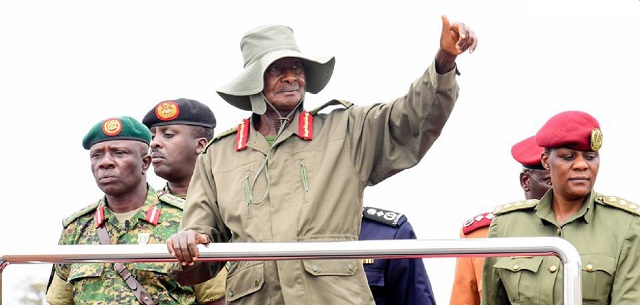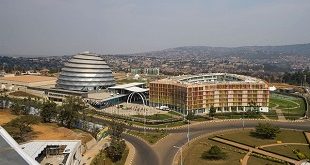
In August 2019, Gwanga shot and deflated tyres of a lorry that was ferrying logs in Mitayana district. In 2017, he set fire to a tractor that some businessmen were using to allegedly grab land from his daughter.
It is not clear what action, if any, the army leadership takes against maverick soldiers. In the past, offending soldiers at Kasirye or Juma Seiko’s rank would get a reprimand from the commander in chief, President Yoweri Museveni. Karemire says that is not possible for Kasirye’s case.
“Kasirye Gwanga is a retired officer and he is not even in the Reserve Force,” Karemire says. He adds that Kasirye is not part of the Reserves because he is above 50 years old. He says officers like Kasirye are a matter of the police or other authorities to deal with once they do something contrary to the law.
He says the same for Maj. Gen. Matayo Kyaligonza whose case of beating up a traffic officer who intercepted him as he committed an offence on road, was handled by Police. President Museveni however insists that retired army officers are still members of the UPDF who can be called upon for duty in their retirement.
In December, Gen. Charles Angina, deputy coordinator of Operation Wealth Creation was involved in a land wrangle that pitted a top city tycoon against another. Angina’s involvement on one side attracted the intervention of the Minister for Security, Gen. Elly Tumwine, on the other side. The matter became glaringly public when Tumwine scolded Angina as press cameras rolled. It was even debated in parliament. But nothing appears to have been done about it.
Karemire, the army spokesperson, says there are “internal mechanisms” for handling such confrontations among senior officers. He tells The Independent that besides the mechanisms there are structures such as unit disciplinary committees, division court Martials and the General Court Martial which sits in Makindye, Kampala.
But Muhammad Muwanga Kivumbi, the vocal MP on parliamentary committee of Internal and Defence Affairs says more needs to be done about soldiers who terrorise civilians.
“If you are a person like Juma Seiko and you are always moving around with a gun, you need to be constantly checked on.”
“Of course, UPDF is strict on punishment, but does that apply to Juma Seiko? he says, “What example does Gen. Tumwine set when stands up to abuse people? Are there role models in the army? By and large these amount to administrative challenges.”
He says such soldiers need psycho social support. “They are armed, and you see what goes on in their background. We need to constantly strengthen their psycho social support.” He tells The Independent.
Kivumbi says maybe the capacity of the UPDF to provide such services needs to be interrogated.
He says it is not an ideal situation but adds that it is part of a process of review and accountability. “The physical and psychological situation keeps changing.”
Kivumbi also sounds a note of caution to people who work in private security companies for the threat they pose to innocent human life. “These people carry weapons of war but because the companies are owned by directors of top security apparatus there are accountability issues.”
He says soldiers may react harshly to incidents such as contracting of certain diseases which may make them susceptible to violence.
Shooting of civilians by UPDF soldiers is nothing new. But unlike in the past, whenever shootings happen now, there are fears that no disciplinary action will be taken. Many observers say this inaction by the army leadership breeds impunity among soldiers and fear among the public.
Many civilians recall incidents where soldiers acting out of fury rush back to the barracks and spray a hail of bullets on those that supposedly aggrieved them. 2016 was a peak year for the UPDF as shootings spiraled out of control. In a space of three months, scores were killed in the country.
On March 5 that year, Sergeant Christopher Odong, a UPDF soldier attached to Soroti Flying School went out for a night at Shooters Pub (as fate would have it) in the town of Soroti. After a few pints, he realised his phone was missing and went out of the pub, came back and shot fellow bar patrons killing three and injuring nine.
In April, Lance Corporal Moses Katoko Katwesigye shot to death eight people in Kanungu district after a domestic brawl.
Two months later, Sergeant, Isaac Obua, a UPDF soldier attached to Makindye Military Barracks shot and killed seven people including children. His colleagues shot at him and he died instantly in another chilling episode.
Many of these offending soldiers were punished firmly by the army based on the force’s strict code of conduct when it comes to dealing with army officers who shoot innocent people.
 The Independent Uganda: You get the Truth we Pay the Price
The Independent Uganda: You get the Truth we Pay the Price



